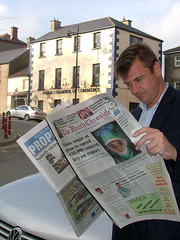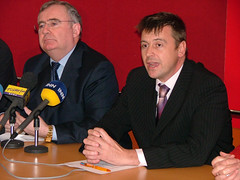Sunday, November 22, 2009
Foreign Affairs Committee gets report on the assault on Gaza
This week the Foreign Affairs Committee was lucky to have one of the authors of the Goldstone Report on the invasion into Gaza by Israeli troops come in to speak to us. Colonel Desmond Travers is a retired Colonel of the Irish Army and full credit must go to Senator Mark Daly for arranging for Col Travers to brief the committee.
Col Travers went through the report and drew out some key messages. The report found evidence that some Israelis had intentionally killed Palestinian civilians during the assault. The report said that the Israeli military assault on Gaza was “a deliberately disproportionate attack designed to punish, humiliate and terrorize a civilian population, radically diminish its local economic capacity both to work and to provide for itself, and to force upon it an ever increasing sense of dependency and vulnerability.”
I brought up the subject of the ongoing hardship that is being experienced by Gazan civilians. This is particularly the case given the damage to food production (30% of the agricultural land has been ruined) as well as the image of the war on the water and sanitation systems. In my view we must do what we can to ensure that there life is made more bearable for the people living in the territory.
As Col Travers pointed out, this is one report that is refusing to go ahead. It will not be buried and forgotten.
We got an answer back to a parliamentary question we asked about children's teeth in Meath. It follows on from a meeting I had with the Irish Dental Association about a month back. The representatives of the IDA told me that because of the cutbacks to the School Dental Schmeme (whereby children of school going age get access to a dentist) less children are seeing their dentist fro a regular checkup. A result is that when they do go it because they have a bad tooth, but often it's too late for the dentist to do anything to save the teeth and as a result it must be extracted.
It turns out that over 2,000 teeth were pulled last year from children in Meath. Some of these were baby teeth but others were permanent teeth. I can imagine that parents must be furious if one of their children has to have a permanent tooth extracted at a young age, all because of a lack of dentists to catch the problem in time. I have called for more dentists to be made available within the Meath area, so that the school dental program can do its job.
Col Travers went through the report and drew out some key messages. The report found evidence that some Israelis had intentionally killed Palestinian civilians during the assault. The report said that the Israeli military assault on Gaza was “a deliberately disproportionate attack designed to punish, humiliate and terrorize a civilian population, radically diminish its local economic capacity both to work and to provide for itself, and to force upon it an ever increasing sense of dependency and vulnerability.”
I brought up the subject of the ongoing hardship that is being experienced by Gazan civilians. This is particularly the case given the damage to food production (30% of the agricultural land has been ruined) as well as the image of the war on the water and sanitation systems. In my view we must do what we can to ensure that there life is made more bearable for the people living in the territory.
As Col Travers pointed out, this is one report that is refusing to go ahead. It will not be buried and forgotten.
We got an answer back to a parliamentary question we asked about children's teeth in Meath. It follows on from a meeting I had with the Irish Dental Association about a month back. The representatives of the IDA told me that because of the cutbacks to the School Dental Schmeme (whereby children of school going age get access to a dentist) less children are seeing their dentist fro a regular checkup. A result is that when they do go it because they have a bad tooth, but often it's too late for the dentist to do anything to save the teeth and as a result it must be extracted.
It turns out that over 2,000 teeth were pulled last year from children in Meath. Some of these were baby teeth but others were permanent teeth. I can imagine that parents must be furious if one of their children has to have a permanent tooth extracted at a young age, all because of a lack of dentists to catch the problem in time. I have called for more dentists to be made available within the Meath area, so that the school dental program can do its job.
Sunday, November 15, 2009
How Each Senator Voted on NAMA
NAMA took up most of the week in the Seanad. We discussed the Second Stage of the legislation on Monday, concluding just before midnight. We sat again on Tuesday morning from 10:30 right through until 2am Wednesday morning. On Wednesday Committee Stage continued for a few hours. We then went to Report and Final Stage. Our last vote was about a quarter to ten on Wednesday night. I got out of the House directly afterwards.
I was exhausted by the time I got home an hour later. I turned on the TV to unwind and woke up at quarter past three in my chair! I carted myself off to bed and slept like a log. Next day (Thursday) returned to normality and I was in for the Order of Business, when I brought up the subject of the need to grow our foreign exports.
The NAMA debate was fascinating. The Labour benches contain two of the finest legal minds in the country, Senator Alex White and Senator Ivana Bacik, and they were hugely impressive to watch up close. I was also impressed by other Senators from both sides of the House. I also have to say that whilst we don't agree with the fundamentals of the legislation, Minister Brian Lenihan gave a very accomplished performance.
Lenihan was clearly on top of the detail of the Bill and as a result he was able to robustly defend his position on amendments. During the three days of debate he was unable to be there for the entire time and on occasions a different Minister sat in for him. Some of these were also impressive, for instance, Minister Peter Power gave a good performance. Other stand-ins did not appear to have as complex an understanding of the legislation.
I was disappointed that one of my amendments on the need for NAMA to provide a social dividend was rejected. My amendment was to allow unused properties in town centres to be provided to community groups on short-term leases at minimal rent. This would help to address the shortage of facilities for youth and community groups across the commuter belt. I put the matter to a vote and unfortunately it was defeated.
On the subject of the voting, I thought it would be useful to do a quick summary of the voting record of each and every Senator. The issue of NAMA is hugely important and has led to many emails from interested citizens to politicians and I thought that people might like to see an analysis of the votes.
In total, there were 18 votes over the three days. These included votes on the Second Stage debate, Committee amendments and votes on the Report and Final stage of the Bill
As expected, all of the Fianna Fail members voted with their government on every vote. So to did the Green Party and Fiona O'Malley.
The 6 Labour Senators voted against the government 100% of the time. There was an abstention rate of just 3% (i.e. in the 18 votes, of the total 108 votes that could be cast by the 6 Labour members, they voted 105 times).
The 15 FG Senators voted against the government 100% of the time. There was an abstention rate of just 2% (i.e. in the 18 votes, of the total 270 votes that could be cast by the 15 FG members, they voted 265 times).
The voting patterns of the Independent Senators were varied and as a result I provide them by the individual Senator.
Shane Ross voted against the government 10 times, with the government once and abstained on the other 7 votes.
David Norris voted against the government 14 times, with the government 4 times and didn't miss a vote.
Ronan Mullen voted against the government 9 times, with the government 6 times and abstained on the other 3 votes.
Fergal Quinn voted with the government twice and didn't vote on the other 16 occasions. Fergal did not vote against the government on any vote.
Joe O'Toole voted with the government 11 times, and abstained on the other 7 votes. Joe did not vote against the government on any vote.
The government won every one of the 18 votes cast. However, some of the votes could have gone the other way had the six independent Senators voted against the government en masse.
Please note - feel free to use / repeat / circulate this voting record to whomever you like. But just be clear that on the matter of abstentions above, one cannot tell whether these were deliberate or unavoidable. For instance, one Senator was unable to attend last week due to personal reasons. The fact that a Senator missed 0, 1, 2 or 10 votes may be very justifiable, and should be checked directly with the Senator in question.
I was exhausted by the time I got home an hour later. I turned on the TV to unwind and woke up at quarter past three in my chair! I carted myself off to bed and slept like a log. Next day (Thursday) returned to normality and I was in for the Order of Business, when I brought up the subject of the need to grow our foreign exports.
The NAMA debate was fascinating. The Labour benches contain two of the finest legal minds in the country, Senator Alex White and Senator Ivana Bacik, and they were hugely impressive to watch up close. I was also impressed by other Senators from both sides of the House. I also have to say that whilst we don't agree with the fundamentals of the legislation, Minister Brian Lenihan gave a very accomplished performance.
Lenihan was clearly on top of the detail of the Bill and as a result he was able to robustly defend his position on amendments. During the three days of debate he was unable to be there for the entire time and on occasions a different Minister sat in for him. Some of these were also impressive, for instance, Minister Peter Power gave a good performance. Other stand-ins did not appear to have as complex an understanding of the legislation.
I was disappointed that one of my amendments on the need for NAMA to provide a social dividend was rejected. My amendment was to allow unused properties in town centres to be provided to community groups on short-term leases at minimal rent. This would help to address the shortage of facilities for youth and community groups across the commuter belt. I put the matter to a vote and unfortunately it was defeated.
On the subject of the voting, I thought it would be useful to do a quick summary of the voting record of each and every Senator. The issue of NAMA is hugely important and has led to many emails from interested citizens to politicians and I thought that people might like to see an analysis of the votes.
In total, there were 18 votes over the three days. These included votes on the Second Stage debate, Committee amendments and votes on the Report and Final stage of the Bill
As expected, all of the Fianna Fail members voted with their government on every vote. So to did the Green Party and Fiona O'Malley.
The 6 Labour Senators voted against the government 100% of the time. There was an abstention rate of just 3% (i.e. in the 18 votes, of the total 108 votes that could be cast by the 6 Labour members, they voted 105 times).
The 15 FG Senators voted against the government 100% of the time. There was an abstention rate of just 2% (i.e. in the 18 votes, of the total 270 votes that could be cast by the 15 FG members, they voted 265 times).
The voting patterns of the Independent Senators were varied and as a result I provide them by the individual Senator.
Shane Ross voted against the government 10 times, with the government once and abstained on the other 7 votes.
David Norris voted against the government 14 times, with the government 4 times and didn't miss a vote.
Ronan Mullen voted against the government 9 times, with the government 6 times and abstained on the other 3 votes.
Fergal Quinn voted with the government twice and didn't vote on the other 16 occasions. Fergal did not vote against the government on any vote.
Joe O'Toole voted with the government 11 times, and abstained on the other 7 votes. Joe did not vote against the government on any vote.
The government won every one of the 18 votes cast. However, some of the votes could have gone the other way had the six independent Senators voted against the government en masse.
Please note - feel free to use / repeat / circulate this voting record to whomever you like. But just be clear that on the matter of abstentions above, one cannot tell whether these were deliberate or unavoidable. For instance, one Senator was unable to attend last week due to personal reasons. The fact that a Senator missed 0, 1, 2 or 10 votes may be very justifiable, and should be checked directly with the Senator in question.
Sunday, November 08, 2009
Simon Community warns on homelessness
Last week the Environment Committee, of which I am a member, received a presentation from the Simon Communities of Ireland in relation to homelessness.
The organisation provides services to around 5,000 people annually. As well as this they campaign for better facilities and treatment of homeless people, and for the root-causes to be addressed.
In attendance at the committee was their Chief Executive Officer, Mr Patrick Burke, as well as their research officer and staff from their Dublin, Cork and Dundalk offices.
As part of their presentation we were provided with the results of a recent study of their clients. Some of the numbers were shocking to me. Almost 60% of those who came into Simon’s facilities had a mental health condition, a further 48% had a diagnosed physical condition and 77% of the total had both.
Four out of five of their users reported using alcohol and almost half of that group described themselves as heavy users. Whilst in the past alcohol used to be the main feature, drug use is now becoming more common.
Niall Mulligan, of the Dundalk Simon Community sees at first-hand how the current recession is hitting people who are vulnerable. He told us that “People turning to us now, often have nowhere else to go, they have run out of options, are in poor health and are isolated, lonely and excluded. Many have experienced great trauma in their lives and at this point their only option is the Simon Community. The added tragedy is that in the current climate all the Simon communities around Ireland are under increasing pressure in terms of funding - with reductions in statutory funding across a range of budget lines and uncertainty in terms of voluntary donations.”
Like the Peoples Resources Centers around the country, it is in times of recession that more people need these services. Currently, the Simon Communities have no idea how much funding they will get next year, other than that it will probably go down. If it does, cuts to services are likely to follow.
The uncertainty of future funding could impact on the behaviour of homeless people within the shelters. In response to a question of mine I was told that the longer a person stays in an uncertain situation the likelier it is for a drug or alcohol addiction to take over. It becomes harder and harder for a person to break an addiction but stability in housing can help to address addiction.
So, cuts to these services, such as to the amount of sheltered housing available can have a real impact on the ground, with more people likely to have to go without services, fewer people gaining access to rehabilitation centres, higher rates of medical interventions needed by homeless people. My view is that in the short, medium and long term such cutbacks are unlikely to be cost-effective.
The organisation provides services to around 5,000 people annually. As well as this they campaign for better facilities and treatment of homeless people, and for the root-causes to be addressed.
In attendance at the committee was their Chief Executive Officer, Mr Patrick Burke, as well as their research officer and staff from their Dublin, Cork and Dundalk offices.
As part of their presentation we were provided with the results of a recent study of their clients. Some of the numbers were shocking to me. Almost 60% of those who came into Simon’s facilities had a mental health condition, a further 48% had a diagnosed physical condition and 77% of the total had both.
Four out of five of their users reported using alcohol and almost half of that group described themselves as heavy users. Whilst in the past alcohol used to be the main feature, drug use is now becoming more common.
Niall Mulligan, of the Dundalk Simon Community sees at first-hand how the current recession is hitting people who are vulnerable. He told us that “People turning to us now, often have nowhere else to go, they have run out of options, are in poor health and are isolated, lonely and excluded. Many have experienced great trauma in their lives and at this point their only option is the Simon Community. The added tragedy is that in the current climate all the Simon communities around Ireland are under increasing pressure in terms of funding - with reductions in statutory funding across a range of budget lines and uncertainty in terms of voluntary donations.”
Like the Peoples Resources Centers around the country, it is in times of recession that more people need these services. Currently, the Simon Communities have no idea how much funding they will get next year, other than that it will probably go down. If it does, cuts to services are likely to follow.
The uncertainty of future funding could impact on the behaviour of homeless people within the shelters. In response to a question of mine I was told that the longer a person stays in an uncertain situation the likelier it is for a drug or alcohol addiction to take over. It becomes harder and harder for a person to break an addiction but stability in housing can help to address addiction.
So, cuts to these services, such as to the amount of sheltered housing available can have a real impact on the ground, with more people likely to have to go without services, fewer people gaining access to rehabilitation centres, higher rates of medical interventions needed by homeless people. My view is that in the short, medium and long term such cutbacks are unlikely to be cost-effective.
Sunday, November 01, 2009
Action Needed on Vulture Funds
Last week the Debt and Development Coalition of Ireland came before the Foreign Affairs Committee. The aim was to update us on progress in relation to a Justice Centered Irish debt policy.
The Coalition suggested six recommendations for action. These included one particular issue in relation to the existence of Vulture Funds. These funds buy up sovereign debt of poor countries, often paying very little for the “face value” of the debt, and then chase the countries for payment of the full amount. There have been some atrocious incidences in recent years. At the Committee I brought up the example of one Vulture Fund, Donegal International.
The story began in 1979 when the Zambian government borrowed $15 million dollars from the Romanian government. Over time the Zambians realised they could not pay and so they attempted to seek a revised payment agreement with the Romanian government. However, early in 1999, just before a deal was done, the Romanians sold off the entire debt to a private limited company called Donegal International for $3.3 million.
Over the next few years the Zambians started to pay off some of this money. By the end of 2003 they had paid off $2.4 million – 75% of what Donegal International had paid for the debt. At that stage, for various reasons, Donegal International took the Zambian government to court for the full amount owed. In 2007 The UK High Court found in their favour and awarded then $15 million.
So, for their expenditure of just over $3 million on the loan they got almost $18 million back. Of course, the Donegal International website says that the actual profit, after costs, legal fees etc., is a lot lower than this, but it’s clear that they made a fair old whack from this.
The issue was covered in depth by BBC Newsnight, and you can look at a video report here.
Their actions and their success are no doubt encouraging other vulture funds to do the same. Of course, the impact of this is that much of the debt relief that countries like Zambia are getting is just being eaten up in payments to these vultures. It has been asserted that the payment of $15 million to Donegal International meant that up to 100,000 Zambians went without medical care provision as a result.
There is some hope on the horizon. A Bill has been introduced in the States trying to get the process banned there.
In the UK, Gordon Brown is strongly against allowing such companies to use UK courts to progress claims. But the EU needs to act as well. As part of their presentation to us last week, the Debt Coalition proposed the following recommendation:
“The development of internationally binding, just and responsible financing standards by supporting efforts at EU level to curtail so called “vulture funds” from making claims in EU member state national courts”.
In order to keep pressure on at European level, I have asked our MEP, Nessa Childers, to table the following questions in European Parliament
“To ask what the current policy of the EU is in relation to the curtailment of so called “vulture funds” from making claims in EU member state national courts.”
The Coalition suggested six recommendations for action. These included one particular issue in relation to the existence of Vulture Funds. These funds buy up sovereign debt of poor countries, often paying very little for the “face value” of the debt, and then chase the countries for payment of the full amount. There have been some atrocious incidences in recent years. At the Committee I brought up the example of one Vulture Fund, Donegal International.
The story began in 1979 when the Zambian government borrowed $15 million dollars from the Romanian government. Over time the Zambians realised they could not pay and so they attempted to seek a revised payment agreement with the Romanian government. However, early in 1999, just before a deal was done, the Romanians sold off the entire debt to a private limited company called Donegal International for $3.3 million.
Over the next few years the Zambians started to pay off some of this money. By the end of 2003 they had paid off $2.4 million – 75% of what Donegal International had paid for the debt. At that stage, for various reasons, Donegal International took the Zambian government to court for the full amount owed. In 2007 The UK High Court found in their favour and awarded then $15 million.
So, for their expenditure of just over $3 million on the loan they got almost $18 million back. Of course, the Donegal International website says that the actual profit, after costs, legal fees etc., is a lot lower than this, but it’s clear that they made a fair old whack from this.
The issue was covered in depth by BBC Newsnight, and you can look at a video report here.
Their actions and their success are no doubt encouraging other vulture funds to do the same. Of course, the impact of this is that much of the debt relief that countries like Zambia are getting is just being eaten up in payments to these vultures. It has been asserted that the payment of $15 million to Donegal International meant that up to 100,000 Zambians went without medical care provision as a result.
There is some hope on the horizon. A Bill has been introduced in the States trying to get the process banned there.
In the UK, Gordon Brown is strongly against allowing such companies to use UK courts to progress claims. But the EU needs to act as well. As part of their presentation to us last week, the Debt Coalition proposed the following recommendation:
“The development of internationally binding, just and responsible financing standards by supporting efforts at EU level to curtail so called “vulture funds” from making claims in EU member state national courts”.
In order to keep pressure on at European level, I have asked our MEP, Nessa Childers, to table the following questions in European Parliament
“To ask what the current policy of the EU is in relation to the curtailment of so called “vulture funds” from making claims in EU member state national courts.”








